Swirlds, a company that created the hashgraph distributed consensus platform, and CULedger today announced they have entered into an agreement under which CULedger will use Swirlds’ hashgraph technology as a “key component” of CULedger’s permissioned, distributed, shared ledger platform for credit unions.
CULedger is a credit union consortium supported by the Credit Union National Association and the Mountain West Credit Union Association.
The parties explained that CULedger and Swirlds are “making it simple” for application developers to build distributed applications that can be used by any number of credit unions. Swirlds hashgraph provides the shared storage (distributed ledger) for these applications, thereby “reducing the opportunity for errors, improving efficiency, and ensuring a consistent view of data” by all parties.

“After evaluation of numerous distributed ledger technologies, it quickly became clear to us that Swirlds delivers both the performance and banking-grade security that our members will demand of shared applications and data stores,” Rick Cranston, VP of innovation for MWCUA and member of the CULedger steering committee, said in a statement. “Our members are interested in building numerous distributed ledger applications to drive revenue, improve member service, and reduce fraud. Swirlds hashgraph will enable them to build and leverage distributed applications, while feeling highly confident of the security and capacity of these applications.”
Swirlds hashgraph can process hundreds of thousands of transactions per second, making it possible for CULedger to “directly address a much broader set of use cases,” the consortium added.

“CULedger is an incredibly innovative project, which is helping to lay the foundation for the future of credit unions,” said Mance Harmon, founder and CEO of Swirlds. “We are extremely pleased to be partnering with them to help credit unions remain competitive, aggressive, and serve the needs of their members more efficiently.”
Earlier this week, the National Association of Federally-Insured Credit Unions





